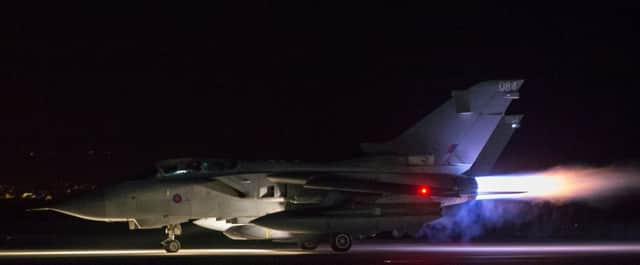Ian Swanson: Bombing without OK of MPs might backfire on May


The decision to launch the attacks was taken by Prime Minister Theresa May with the backing of her Cabinet colleagues. But the failure to recall parliament to get its approval, or to delay the action a few days until MPs returned from their Easter break, has been heavily criticised.
Today’s debate – called under a procedure which limits the discussion and makes a meaningful vote difficult – is too little, too late.
Advertisement
Hide AdAdvertisement
Hide AdFirst Minister Nicola Sturgeon has been among the most outspoken critics of the action, deploring it as “some kind of macho strongman stand-off between Trump and Putin” and saying it allowed western leaders to “feel as if they’re doing something” but risked further escalating an already dangerous situation.
Scottish Labour leader Richard Leonard called the air strikes “legally, morally and democratically questionable”.
Polls suggested there was not majority public support for the military action against Syria.
But many will feel at least some relief – that there were not mass civilian casualties, that it did not involve a direct engagement between the US and Russia and that it was a limited attack, the Pentagon’s more cautious approach apparently winning out against President Trump’s instinct for a larger-scale assault.
Advertisement
Hide AdAdvertisement
Hide AdNevertheless, the raids could so easily have turned out otherwise. Innocent Syrian men, women and children could have been killed by our missiles. America and Russia could have ended up in direct conflict. Or President Trump could have overruled his defence chiefs and insisted on more extensive action. Saturday’s raids may not be the end of the story.
But even if British forces do not take part in any further raids, the principle of parliamentary approval for such action should not be allowed to fall by the wayside. Commentators are quick to explain there is no legal requirement for the Prime Minister to consult parliament before going to war and that to do so is a recent “convention”.
But this convention is not some technical process which governments have happened to follow, it was a clear shift of power and responsibility which was accepted across parties as essential, not least in the light of Iraq.
The vote by MPs in 2003 to back Tony Blair’s planned action against Saddam Hussein set an important precedent. Later claims that he misled parliament over the case for war underlined the role of the Commons as a check on government action.
Advertisement
Hide AdAdvertisement
Hide AdMPs also backed action in Libya in 2011 but blocked raids on Syria in 2013. Academics noted MPs’ approval may be “legally unnecessary” but was “central to the legitimacy” of military action. One even said that barring a change of heart “no future British military deployment will achieve domestic legitimacy without MPs’ express support”.
If Mrs May chose to bypass parliament because she feared she might not get that support, her decision to launch the raids would be even more questionable.